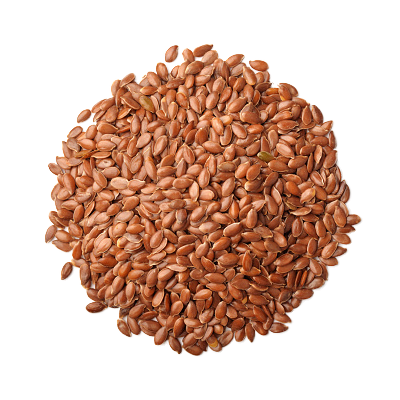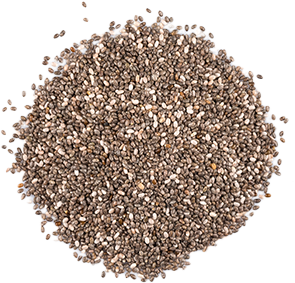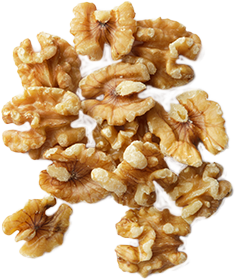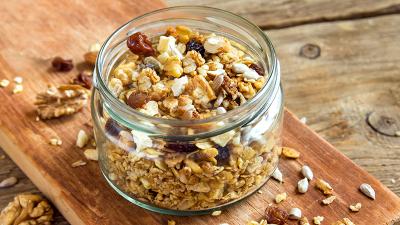Omega-3 Fatty Acids and Plant-Based Diets
Get omega-3s with ease on a plant-based diet!
Omega-3 fatty acids are important for maintaining heart and brain health. But you don't need to turn to fish—or fish oil supplements—to get your omega-3s. Keep reading to get the answers to frequently asked questions about omega-3s and plant-based diets!
What are omega-3s?
Omega-3s are essential fatty acids. They play an important role in cellular function and in maintaining heart health, brain health, kidney function, eye health, and skin health.
Are omega-3s found in plant foods?
Omega-3 fatty acids are readily available in a wide variety of plant foods. Sources include walnuts, flaxseed, chia seeds, hemp seeds, edamame, seaweed, and algae. Other green leafy vegetables and beans also contain small amounts.
Are plant-based omega-3 sources different from fish-based sources?
Plant-derived omega-3s come in the form of alpha-linolenic acid (ALA)—which is the only essential omega-3 fatty acid. Our bodies cannot synthesize it, so we must consume ALA through our diets. The body naturally converts ALA into the longer-chain omega-3 fatty acids docosahexaenoic acid (DHA)—which is important for brain health—and eicosapentaenoic acid (EPA).
Fish contain both DHA and EPA. But that doesn’t mean that individuals following plant-based diets are deficient in these longer-chain omega-3s. In fact, women following vegan diets actually had significantly more long-chain omega-3 fats in their blood, compared with fish eaters, meat eaters, and ovo-lacto-vegetarians, according to findings from the European Prospective Investigation into Cancer and Nutrition (EPIC) Study.1 Despite zero intake of long-chain omega-3s (EPA and DHA) and lower intake of the plant-derived ALA, vegan participants converted robust amounts of shorter-chain fatty acids into these long-chain fatty acids, compared with fish eaters.
Do people eating plant-based diets have adequate omega-3 levels?
Most people following plant-based diets have no problem getting enough omega-3s in their diets. One study found that people who follow vegan diets, on average, have intakes above the recommended amounts for omega-3 fats.2
When it comes to measuring omega-3 levels, the likelihood of having lower EPA and DHA levels among vegans is, on average, higher; however, this does not extend to any known clinical relevance. In fact, researchers note the advantage of a vegan diet for heart health compared with a nonvegan diet.3
Another benefit plant-based eaters may have is a more desirable ratio of omega-6 to omega-3 fatty acids compared with a Standard American Diet. Omega-6 fatty acids are known as the pro-inflammatory fats, whereas omega-3 fatty acids are known as the anti-inflammatory fats. The desired ratio of omega-6 to omega-3 is 4:1; however, most Americans are consuming a ratio of 20:1, which can lead to excess inflammation in the body. The Standard American Diet consists of excessive amounts of foods rich in omega-6 fatty acids, such as processed and fast foods, and foods containing safflower oil, sunflower oil, corn oil, and soybean oil. Therefore, people eating diets rich in whole, plant-based foods may have a more adequate ratio of omega-6 to omega-3.4
Is a plant-based diet healthy for the brain?
Plant-based foods are beneficial to the brain and may help prevent Alzheimer’s disease and other forms of dementia. Although omega-3s are important for brain health, optimal brain health is about more than omega-3 intake. Research shows that saturated and trans fats—found in animal products, pastries, and fried foods—can increase the risk for cognitive decline.5 Foods rich in vitamin E—including nuts, seeds, leafy greens, and whole grains—are especially beneficial for brain health. Studies have also suggested that vitamin C—found in fruits and vegetables—may help protect against cognitive decline.6
Is fish consumption heart-healthy?
Although some of the fat found in fish comes in the healthy omega-3 form, much of the remaining fat is unhealthful saturated fat. For example, chinook salmon derives 52% of its calories from fat, a quarter of which is saturated fat. Fish and shellfish are also significant sources of cholesterol. Three ounces of bass has about 80 milligrams of cholesterol—the same amount found in a 3-ounce steak. Diets high in saturated fat and cholesterol can increase the risk of heart disease.
On the other hand, a plant-based diet has been proven to prevent, and even reverse heart disease. One study found that while replacing red meat with plant-based protein lowers the risk for heart disease, replacing red meat with fish did not reduce the risk.7 In another study comparing a Mediterranean diet, which is known to be high in fish and omega-3 fats, to a vegan diet, the low-fat vegan diet had a larger improvement in body weight and cholesterol.8
What about fish oil supplements?
Although fish oil supplements have been touted as a cure for everything from heart problems to arthritis, current research shows that there may not be any benefits to taking the supplement. According to a review that combined data from 20 studies, the use of omega-3 supplements over a two-year period had no effect on heart-related death, heart attack, or stroke.9 Further research found no link between fish oil supplements and the prevention or improvement of dementia.10,11
By focusing on plant foods like vegetables, fruits, whole grains, and legumes, you’ll get the full range of essential nutrients without the toxins and other health risks associated with fish consumption.12
Work with your physician if you are considering or starting an omega-3 supplement. Omega-3 supplementation may be advised for those with increased needs, such as pregnant and lactating women, elderly individuals, and those with certain chronic diseases. Consider algae-based DHA and EPA supplementation if you are concerned you are not getting enough from food.
Plant-Powered Prescription for Omega 3s
Include at least 1 tablespoon of a plant-rich omega-3 food (ground flaxseed, chia seeds, or hempseeds) daily to meet your omega 3 needs.
Plant-Based Sources of Omega-3s:
Flaxseed
A tablespoon of flaxseed contains 2.4 grams of omega-3s!
top of oatmeal or bake into bread, muffins, or other baked goods.
Chia Seeds
An ounce of chia seeds contains 5 grams of omega-3s per serving!
smoothies, oatmeal, and chia seed pudding.
Beans
Half a cup of beans contains 0.10 grams of omega-3s!
soups, salads, dips, hummus, veggie burgers, burritos, and chili!
Walnuts
An ounce of walnuts contains 2.6 grams of omega-3s!
a topping for oatmeal or salads or eaten straight out of hand!
Edamame
Half a cup of edamame contains 0.28 grams of omega-3s!
salads, stir-fries, and soups.
Omega-3 Sources for Vegans
Dr. Jim Loomis reveals the best vegan omega-3 sources when he joins “The Weight Loss Champion” Chuck Carroll on The Exam Room LIVE.
Try plant-based recipes that are rich in omega-3s!
Learn More
DID YOU KNOW?
Beans and other high-fiber foods satisfy hunger more than meat.
References
- Welch AA, Shakya-Shrestha S, Lentjes MA, Wareham NJ, Khaw KT. Dietary intake and status of n-3 polyunsaturated fatty acids in a population of fish-eating and non-fish-eating meat-eaters, vegetarians, and vegans and the product-precursor ratio [corrected] of α-linolenic acid to long-chain n-3 polyunsaturated fatty acids: results from the EPIC-Norfolk cohort [published correction appears in Am J Clin Nutr. 2011 Mar;93(3):676]. Am J Clin Nutr. 2010;92(5):1040-1051. doi:10.3945/ajcn.2010.29457
- Rizzo NS, Jaceldo-Siegl K, Sabate J, Fraser GE. Nutrient profiles of vegetarian and nonvegetarian dietary patterns. J Acad Nutr Diet. 2013;113(12):1610-1619. doi:10.1016/j.jand.2013.06.349
- Sarter B, Kelsey KS, Schwartz TA, Harris WS. Blood docosahexaenoic acid and eicosapentaenoic acid in vegans: associations with age and gender and effects of an algal-derived omega-3 fatty acid supplement. Clin Nutr. 2015;34(2):212-218. doi:10.1016/j.clnu.2014.03.003
- DiNicolantonio JJ, O'Keefe J. The importance of maintaining a low omega-6/omega-3 ratio for reducing the risk of autoimmune diseases, asthma, and allergies. Mo Med. 2021;118(5):453-459.
- Morris MC, Evans DA, Bienias JL, et al. Dietary fats and the risk of incident Alzheimer disease. Arch Neurol. 2003;60(2):194-200. doi:10.1001/archneur.60.2.194
- Morris MC, Evans DA, Bienias JL, et al. Dietary intake of antioxidant nutrients and the risk of incident Alzheimer disease in a biracial community study. JAMA. 2002;287(24):3230-3237. doi:10.1001/jama.287.24.3230
- Ferré MG, Satija A, Blondin SA, et al. Meta-analysis of randomized controlled trials of red meat consumption in comparison with various comparison diets on cardiovascular risk factors. Circulation. 2019;139(15):1828-1845. doi:10.1161/CIRCULATIONAHA.118.035225
- Barnard ND, Alwarith J, Rembert E, et al. A Mediterranean diet and low-fat vegan diet to improve body weight and cardiometabolic risk factors: a randomized, cross-over trial. J Am Nutr Assoc. 2022;41(2):127-139. doi:10.1080/07315724.2020.1869625
- Monaco J, Mounsey A, Bello Kottenstette J. PURLs: should you still recommend omega-3 supplements? J Fam Pract. 2013;62(8):422-424.
- Kwak SM, Myung SK, Lee YJ. Efficacy of omega-3 fatty acid supplements (eicosapentaenoic acid and docosahexaenoic acid) in the secondary prevention of cardiovascular disease: a meta-analysis of randomized, double-blind, placebo-controlled trials. Arch Intern Med. 2012;172(9):686-694. doi:10.1001/archinternmed.2012.262
- Dangour AD, Andreeva VA, Sydenham E, Uauy R. Omega 3 fatty acids and cognitive health in older people. Br J Nutr. 2012;107:S152-S158. doi:10.1017/S0007114512001547
- D Evers, J Digangi, J Petrlik, et al. Global mercury hotspots: new evidence reveals mercury contamination regularly exceeds health advisory levels in humans and fish worldwide. Biodiversity Research Institute and IPEN. 2013. Accessed January 30, 2024. doi:10.13140/RG.2.2.23895.24481. https://www.researchgate.net/publication/282781338/




















